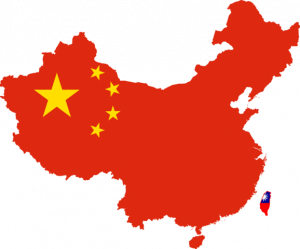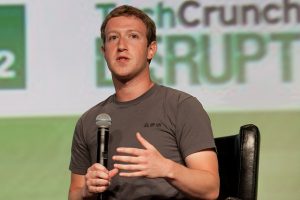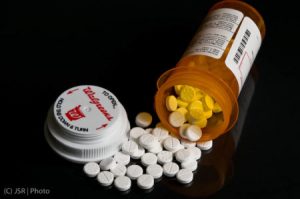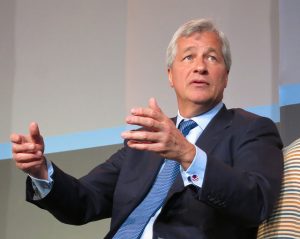By Peter Ward November 18, 2016
China’s Credit Bubble to Burst?

China flag map. ©By DrRandomFactor – Own work, CC BY-SA 3.0
Economists have been predicting a major financial crisis in China for several years now, primarily because of the country’s massive credit boom. A graphics-led article published by Bloomberg this week examines the evidence that a bust is on the horizon, and attempts to predict when it will occur.
The data supporting the bust scenario comes from a gauge put together by the Bank for International Settlements, the credit-to-GDP gap, which is defined as the difference between the credit-to-GDP ratio (national debt vs. GDP) and its long-term trend.
The BIS found in a 2011 analysis of 36 countries that the majority of banking crises followed readings on the credit-to-GDP gap of higher than 10%. China’s current rating is higher than any country on record – above 30%.
The author also shows the credit to GDP gap of other countries which have gone through a credit crisis in recent years. The U.S. rose over the danger level in 2008, just before the Lehman Brothers collapse caused a global financial crisis.
But sometimes the bust doesn’t come. Australia reached danger levels in late 2004 and stayed there until 2008, but dodged a meltdown. Economists are still debating the reasons why, but some think it was either due to the quality of lending or policy moves made to shore up the economy. China will hope they can pull off a similar feat.
Is Facebook Radicalizing Readers?

Mark Zuckerberg, Facebook founder. ©JD Lasica
Social media companies have come under great scrutiny following last week’s election of Donald Trump as President of the U.S. On Wednesday, Buzzfeed published a feature examining the potential of platforms like Facebook to radicalize its users.
Two years ago Facebook changed its algorithm in an attempt to reduce the proliferation of clickbait in user’s feeds and encourage users to spend more time on their news feed. That meant higher priority was given to comments and engagement, which meant content that favored identity became even more valuable. Facebook also began to recommend links that were similar in content to the original post, which could drive users to read more of the same rather than opposing viewpoints.
At the same time, male driven online communities around the world had begun to mobilize politically, a process that was aided by social media. For example, in the UK, football “banter” culture — which has long held an unspoken connection to racism and sexism — has served as a gateway to the pages of some far-right movements where similar views are expressed, creating an echo-chamber effect. “For instance, after a user likes the Australian United Patriots Front page, Facebook suggests more pages to like, such as the National Democratic Party of Australia and Stop The Mosque In Narre Warren. The Britain First page lists Christian Fightback News and Donald Trump as pages you should like next. Facebook’s recommendation engines appear to promote political ideology like any other kind of content, pushing users even deeper.”
Buzzfeed says it reached out to Facebook to see if it has any safeguards in place and got no comment. In recent days Facebook has promised to deny ad space to fake news sites.
Doctors Spending More on Drugs

Drugs ©Justin R
The number of doctors prescribing millions of dollars of medications in Medicare’s drug program is increasing, according to federal data published by ProPublica this week.
The data show that expensive hepatitis C treatments and rising drug prices overall have been a major reason for the rising annual spends by doctors through the Medicare program.
The number of healthcare providers who topped $5 million in prescriptions increased from 41 in 2011 to 514 in 2015. The number of prescribers who exceeded $10 million in drug prescriptions jumped from two to 70 over the same period.
Medicare’s drug program covers more than 41 million seniors and disabled people. In 2015 it accounted for $137.4 billion in drug spending, up from $121.5 billion a year earlier. “The trends in this space are troubling and don’t show any signs of abating,” said Tim Gronniger, deputy chief of staff at the Centers for Medicare and Medicaid Services, the federal agency that runs Medicare. “It’s going to be a pressure point for patients and the program for the foreseeable future.”
Most of the doctors on the highest-spending list prescribed Harvoni or Sovaldi, new drugs that cure hepatitis C. Other providers prescribed expensive drugs to treat cancer, multiple sclerosis and rheumatoid arthritis.
Morgan Stanley Execs Make Millions Post-Election

Jamie Dimon, CEO of JP Morgan Chase, at the JP Morgan Healthcare Conference, January 2013. © Steve Jurvetson/Flickr
It’s still unclear exactly how much Donald Trump’s presidential election win will cost the U.S., but executives from Morgan Stanley have walked away from the result about $10.5 million richer.
Senior executives at the bank earned the figure collectively over the past week by exercising options and selling shares after the rally in bank stocks following the election.
The executives made the money after shares of Morgan Stanley, which have traded as low as $22 over the last 12 months, reached $39.35 on Monday – becoming one of the best performing U.S. banks this year.
Analysts are still saying shares in U.S. banks are underpriced and could rise as Trump’s stance on banking regulations becomes clear. The President-elect has described the Dodd-Frank act as a “very negative force,” and any repealing of regulations would send banking shares higher.
Colm Kelleher, Morgan Stanley’s president, made $3.3 million, and Dan Simkowitz, the head of investment management made $2.3 million.
This Week’s Top Headlines
Janet Yellen: US Fed could raise interest rates ‘soon’ – BBC
Obama meets Merkel in Berlin to discuss TTIP and Russia in wake of Trump win – Philip Oltermann, The Guardian
U.S. Attorney Charges Two Valeant, Philidor Executives, Alleging ‘Fraud and Kickback Scheme’ – Anne Steele, Wall Street Journal
Walmart sees sales rise, profits fall as it heads into holiday shopping season – Sarah Halzack, The Washington Post
Jobless Claims in U.S. Decline to Lowest Level in Four Decades – Patricia Laya, Bloomberg
JPMorgan CEO Dimon still part of Trump Treasury talk – David Henry, Steve Holland, Reuters
AOL lays off 500 employees as Verizon-Yahoo acquisition looms – Fast Company
Mortgage rates spike to near yearly highs following Trump victory – Kathy Orton, Washington Post
Donald Trump: Emerging markets braced for economic effects – Robert Plummer, BBC
Elon Musk wants to cover the world with internet from space – Samuel Gibbs, The Guardian
This entry was posted on Friday, November 18th, 2016 at 9:05 pm. It is filed under Week in Review. You can follow any responses to this entry through the RSS 2.0 feed.
Comments are closed.
